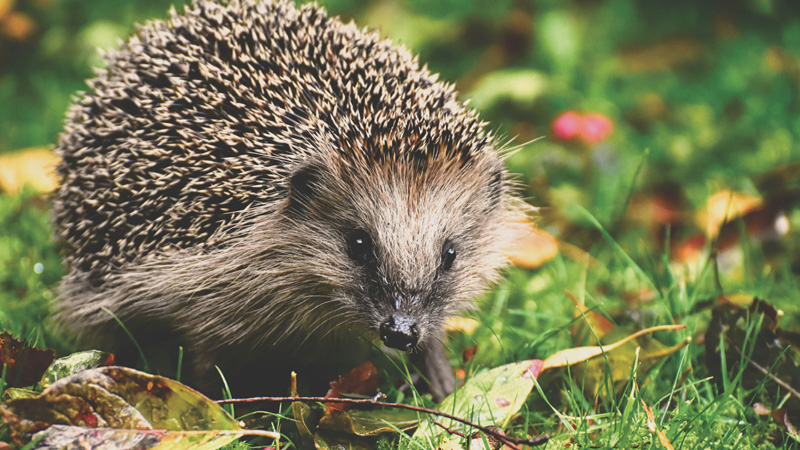What Does a Hedgehog Eat?

Photo by Alexas_Fotos on Unsplash
Hedgehogs, with their endearing appearance and quirky behaviors, have charmed their way into the hearts of animal lovers worldwide. As nocturnal creatures, hedgehogs are primarily known for their distinctive spiny coat and their propensity to curl into a ball when threatened. However, beyond their captivating exterior lies a fascinating dietary regimen that is essential for their health and well-being.
In this article, we delve into the dietary habits of hedgehogs, exploring what these delightful creatures eat and how their nutritional needs can be met in captivity.
Natural Diet of Hedgehogs
In the wild, hedgehogs are opportunistic omnivores, meaning they consume a varied diet consisting of both plant matter and animal protein. Their natural diet typically comprises insects, such as beetles, caterpillars, worms, and slugs, which they forage for during the night. Additionally, hedgehogs may also feed on small vertebrates like frogs, lizards, and even small mammals if the opportunity arises.
The Importance of Insects
Insects play a crucial role in the diet of hedgehogs, providing them with essential nutrients such as protein and fat. In the wild, hedgehogs spend a significant portion of their nightly foraging activities hunting for insects, which serve as a primary source of sustenance. Beetles, mealworms, crickets, and earthworms are particularly favored by hedgehogs and offer a nutritious meal rich in protein and other vital nutrients.
Vegetable Matter
While hedgehogs are primarily insectivores, they also consume a modest amount of plant matter in their diet. Fruits, vegetables, and even some leafy greens may occasionally be part of a hedgehog's foraging repertoire. However, it's important to note that the bulk of their diet should consist of animal protein to meet their dietary requirements adequately.
Commercial Hedgehog Food
For hedgehog owners, providing a balanced and nutritious diet is essential for the health and longevity of their pets. While it may be tempting to replicate a hedgehog's natural diet by offering a variety of insects and vegetables, commercial hedgehog food is often formulated to meet their specific nutritional needs. These specialized diets typically contain a blend of high-quality proteins, fats, vitamins, and minerals tailored to support a hedgehog's health.
Key Nutritional Requirements
When selecting commercial hedgehog food or supplementing their diet with fresh ingredients, it's crucial to consider the following nutritional requirements:
Protein: Hedgehogs require a diet rich in protein to support their growth, muscle development, and overall health. Insects such as mealworms and crickets are excellent sources of protein, while commercial hedgehog food should contain a high percentage of animal-based proteins.
Fat: Fat is an essential energy source for hedgehogs, especially during colder months when they may need to conserve energy to maintain body temperature. Insects like waxworms and mealworms are high in fat and can be offered as occasional treats.
Fiber: While hedgehogs primarily consume animal protein, they also require fiber to support digestive health. Offering small amounts of fruits and vegetables, such as apples, carrots, and leafy greens, can help meet their fiber needs.
Vitamins and Minerals: Hedgehogs need a variety of vitamins and minerals to maintain optimal health. Commercial hedgehog food is typically fortified with essential nutrients like calcium, vitamin D3, and taurine to ensure their dietary requirements are met.
Feeding Guidelines for Pet Hedgehogs
When feeding pet hedgehogs, it's essential to establish a consistent feeding routine and monitor their dietary intake to prevent obesity or nutritional deficiencies. Here are some guidelines for feeding pet hedgehogs:
Offer high-quality commercial hedgehog food as the main component of their diet. Choose a diet specifically formulated for hedgehogs to ensure it meets their nutritional needs.
Supplement their diet with occasional treats such as live insects (e.g., mealworms, crickets) and small amounts of fruits and vegetables. Avoid feeding sugary or high-fat treats excessively, as they can lead to health problems.
Provide fresh water at all times in a shallow dish that is easily accessible to the hedgehog. Monitor water intake to ensure adequate hydration.
Avoid feeding hedgehogs foods that are toxic or harmful to their health, such as chocolate, caffeine, and dairy products.
Conclusion
While hedgehogs in the wild primarily feed on insects, captive hedgehogs require a balanced diet that includes a mix of protein, fat, fiber, vitamins, and minerals in order to thrive. Providing a diverse range of foods such as insects, commercial hedgehog diets, fruits, and vegetables can help meet their nutritional needs and promote overall health.
It is important to avoid offering harmful foods that can be toxic or cause digestive issues in hedgehogs. Additionally, always ensure that fresh water is available for your pet hedgehog at all times.
Consulting with a veterinarian who specializes in exotic animals, particularly hedgehogs, is a valuable resource for obtaining customized dietary recommendations and addressing any specific concerns or questions you may have about your pet's nutrition.
You May Also Like
 Other Pets10 Forbidden Foods for Hedgehogs
Other Pets10 Forbidden Foods for Hedgehogs Other PetsHow Long Do Hedgehogs Live as Pets? Average 6-8 Years
Other PetsHow Long Do Hedgehogs Live as Pets? Average 6-8 Years Other PetsCan I Feed My Hedgehog Cat Food? Yes, Occasionally!
Other PetsCan I Feed My Hedgehog Cat Food? Yes, Occasionally! Other PetsWhat Do Hedgehogs Drink? Clean, Filtered Water
Other PetsWhat Do Hedgehogs Drink? Clean, Filtered Water Pet Names60 Good Names for Pet Hedgehogs (with Meaning)
Pet Names60 Good Names for Pet Hedgehogs (with Meaning) Other PetsHow Big is a 20-Gallon Reptile Tank in Inches?
Other PetsHow Big is a 20-Gallon Reptile Tank in Inches?